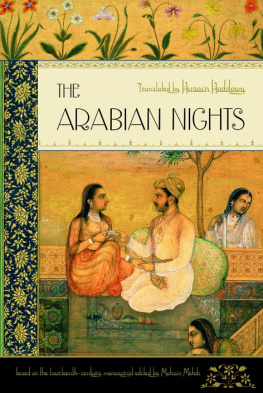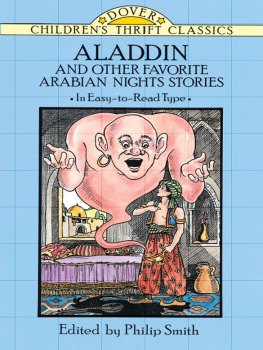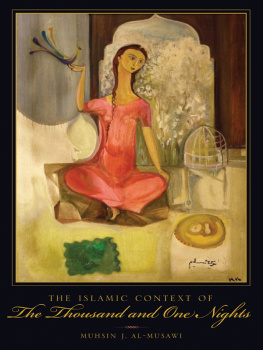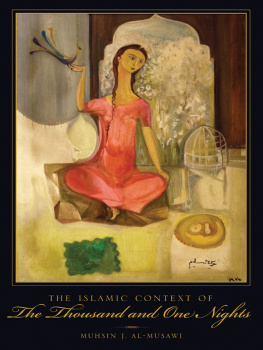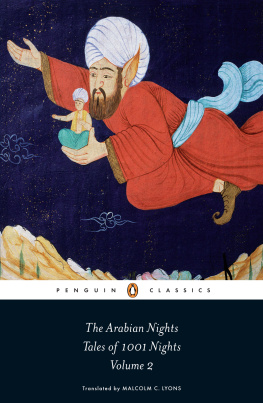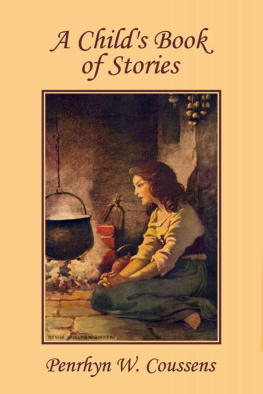The
Arabian
Nights

TRANSLATED BY
Husain Haddawy
BASED ON THE TEXT OF THE
FOURTEENTH-CENTURY SYRIAN MANUSCRIPT
EDITED BY MUHSIN MAHDI
For Mike, and for Myriam,
Peter, Christopher, and Mark.

Contents

THE ARABIAN NIGHTS

Bless thee, Bottom! Bless thee! Thou art translated.
A Midsummer Nights Dream
IT HAS BEEN some years now since as a little boy in Baghdad I used to listen to tales from The Thousand and One Nights . It sometimes seems like yesterday, sometimes like ages ago, for the Baghdad I knew then seems now closer to the time of the Nights than to our own times. It was on long winter nights, when my grandmother was visited by one lady or another, Um Fatma or Um Ali, always dressed in black, still mourning for a husband or a son, long lost. We would huddle around the brazier, as the embers glowed in the dim light of the oil lamp, which cast a soft shadow over her sad, wrinkled face, as if to smooth out the sorrows of the years. I waited patiently, while she and my grandmother exchanged news, indulged in gossip, and whispered one or two asides. Then there would be a pause, and the lady would smile at me, and I would seize the proffered opportunity and ask for a storya long story. I used to like romances and fairy tales best, because they took me to a land of magic and because they were long.
The lady would begin the story, and I would listen, first apprehensively, knowing from experience that she would improvise, depending on how early or late the hour. If it was early enough, she would spin the yarn leisurely, amplifying here and interpolating there episodes I recognized from other stories. And even though this sometimes troubled my childish notions of honesty and my sense of security in reliving familiar events, I never objected, because it prolonged the action and the pleasure. If the hour was late, she would, in spite of my entreaties, tell either a brief story or one of normal length, summarizing here and omitting there. If I knew the story, I would protest, reminding her of what she had left out, and she, smilingly, would promise to tell me the story in its entirety the next time. I would then entreat her to narrate at least such and such an episode. Sometimes my grandmother, out of love for me and her own delight in the story, would add her voice to mine, and the lady, pleased to be appreciated and happy to oblige, would consent to go on, narrating in a gentle, steady voice, except when she impersonated a man or woman in a moment of passion or a demon in a fit of anger, at times getting up to act out the part. Her pauses were just as delicious as her words, as we waited, anticipating a pleasure certain to come. At last, with the voice still steady but the pauses shorter and less frequent, she would reunite the lovers or reconcile the hero to fate, bringing the story, alas, to an end and leaving me with a feeling of nostalgia, a sense at once of fulfillment and of loss. Then I would go to sleep, still living with magic birds and with demons who pursued innocent lovers and haunted my dreams, and often dreaming, as I grew older, of a face in Samarkand that glowed with love and blessed my waking hours.
So has the drab fabric of life been transformed into the gossamer of romance, as these stories have been spun for centuries in family gatherings, public assemblies, and coffeehouses, in Baghdad, Damascus, or Cairo. (Indeed, on a recent trip to Marrakech, I came across storytellers in a public square, mesmerizing their audiences.) Everybody has loved them, for they enchanted the young and the old, alike, with their magic.
In the Nights themselves, tales divert, cure, redeem, and save lives. Shahrazad cures Shahrayar of his hatred of women, teaches him to love, and by doing so saves her own life and wins a good man; the Caliph Harun al-Rashid finds more fulfillment in satisfying his sense of wonder by listening to a story than in his sense of justice or his thirst for vengeance; and the king of China spares four lives when he finally hears a story that is stranger than a strange episode from his own life. Even angry demons are humanized and pacified by a good story. And everyone is always ready to oblige, for everyone has a strange story to tell.
The work consists of four categories of folk talesfables, fairy tales, romances, and comic as well as historical anecdotes, the last two often merging into one category. They are divided into nights, in sections of various lengths, a division that, although it follows no particular plan, serves a dual purpose: it keeps Shahrayar and us in suspense and brings the action to a more familiar level of reality. The essential quality of these tales lies in their success in interweaving the unusual, the extraordinary, the marvelous, and the supernatural into the fabric of everyday life. Animals discourse and give lessons in moral philosophy; normal men and women consort or struggle with demons and, like them, change themselves or anyone else into any form they please; and humble people lead a life full of accidents and surprises, drinking with an exhalted caliph here or sleeping with a gorgeous girl there. Yet both the usual incidents and the extraordinary coincidences are nothing but the web and weft of Divine Providence, in a world in which people often suffer but come out all right at the end. They are enriched by the pleasure of a marvelous adventure and a sense of wonder, which makes life possible. As for the readers, their pleasure is vicarious and aesthetic, derived from the escape into an exotic world of wish fulfillment and from the underlying act of transformation and the consequent pleasure, which may be best defined in Freudian terms as the sudden overcoming of an obstacle.
Such an effect, which is contingent on merging the supernatural and the natural and securing a willing suspension of disbelief, the storyteller of the Nights produces by the precise and concrete detail that he uses in a matter-of-fact way in description, narration, and conversation, bridging the gap between the natural and supernatural situations. It is this quality, by the way, that explains the appeal of these tales to the romantic imagination. For instance, the she-demon is a serpent as thick as the trunk of a palm tree, while the demon is as thin as a spear and as long as two; the transparent curtain hiding the gorgeous girl in the bed is red-speckled; and the seductive girl from Baghdad buys ten pounds of mutton, while the pious gardener buys two flagons of wine for the mysterious lovers. Thus the phantasmagoric is based on the concrete, the supernatural grounded in the natural.
THE STORIES OF the Nights are of various ethnic origins, Indian, Persian, and Arabic. In the process of telling and retelling, they were modified to conform to the general life and customs of the Arab society that adapted them and to the particular conditions of that society at a particular time. They were also modified, as in my own experience, to suit the role of the storyteller or the demand of the occasion. But different as their ethnic origins may be, these stories reveal a basic homogeneity resulting from the process of dissemination and assimilation under Islamic hegemony, a homogeneity or distinctive synthesis that marks the cultural and artistic history of Islam.
No one knows exactly when a given story originated, but it is evident that some stories circulated orally for centuries before they began to be collected and written down. Arab historians of the tenth century, like al-Masudi and ibn al-Nadim speak of the existence of such collections in their time. One was an Arabic work called The Thousand Tales or The Thousand Nights , a translation from a Persian work entitled Hazar Afsana (A thousand legends). Both works are now lost, but although it is not certain whether any of these stories or which of them were retained in subsequent collections, it is certain that the Hazar Afsana supplied the popular title as well as the general schemethe frame story of Shahrazad and Shahrayar and the division into nightsto at least one such collection, namely The Thousand and One Nights .
Next page
